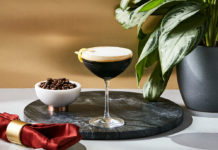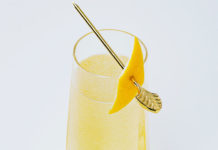By Ashley Bray
Over the last week, the world has watched Russian forces invade Ukraine in an attempt to take over the country. This has had many political, social, and financial repercussions around the world, and it has created a humanitarian crisis at the center of the conflict.
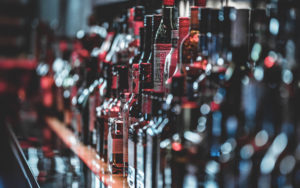 It has also had effects on the U.S. hospitality industry, which has stepped up to make its voice heard during this unprecedented time.
It has also had effects on the U.S. hospitality industry, which has stepped up to make its voice heard during this unprecedented time.
Bars Pull Russian Products
Bars around the country are taking a stand against the Russian invasion by pulling Russian vodkas from their back bars and their menus. A growing list of states have even gone as far as to ban the sale/purchase of Russian liquor products, including Ohio, Alabama, Maine, Utah, New Hampshire, West Virginia, Iowa, Oregon, Texas, and more.
Instead, many bars have started pouring and promoting Ukrainian spirits, such as Khor, Nemiroff, and Kozak vodkas.
“We have seen a lot of charitable activity in terms of collecting donations for Ukraine, but the most notable act is in the rejection and removal of Russian products in further support of the various financial sanctions being imposed on Russia,” said Marbet Lewis, founding partner, CEO of Spiritus Law, a law firm that works in alcohol licensing, food service law, hospitality laws, alcohol marketing, and more. “The intent is to pressure Russian businesses to push back against their own government as they see their products being removed from shelves and sales coming to a screeching halt.
“Off-premise establishments have been taking the lead on the removal of Russian products from shelves, but restaurants and other on-premise venues like bars and restaurants are starting to follow by removing such items from their menus or any featured cocktail recipes.”
Despite mostly widespread support, Lewis notes that there may be some push back in areas with a large population of Russian business owners, such as in parts of New York and South Florida. “There may be some fall-out and continued demand for Russian products,” she says.
Overall, however, these moves are having, and will continue to have, financial ramifications for Russian businesses. “Russian producers will soon start to feel the impact on their bottom lines and sales as both on- and off-premise businesses continue to shut out Russian products and stop ordering more products,” says Lewis. “The long-term effects will definitely be felt by Russian producers as they lose market share and struggle to find other sales avenues within the hospitality and alcohol industries.”
Of course, the domestic businesses, like bars and restaurants, banning Russian products are also feeling the effects. “There is obviously a financial impact on domestic businesses as well since they have already invested in carrying these Russian products in their inventory and now will not realize the benefits of sales of those products as they are removed from the shelves,” says Lewis. “So, this effort will have a more immediate financial impact on domestic businesses.”
World Central Kitchen
Chef José Andrés’ World Central Kitchen (WCK) provides meals on the front lines in response to humanitarian, climate, and community crises.
Within hours of the Russian invasion of Ukraine, WCK began serving freshly made, hot meals at a 24-hour pedestrian border crossing in southern Poland. They quickly expanded their efforts to provide meals to Ukrainians in need who are staying in their cities (i.e., Lviv and Kharkiv) as well as refugees fleeing to the neighboring countries of Poland, Romania, Hungary, Moldova, and soon Slovakia.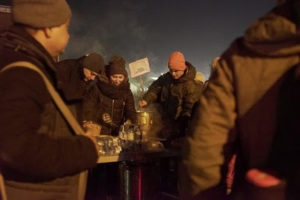
WCK is working with local restaurants, caterers, and food trucks in the region to provide nourishing meals at border crossings, shelters, and other refugee communities.
In a recent video posted to his Twitter account, Andrés showed a WCK Ukrainian restaurant partner in Lviv and said, “I’m so proud to see our restaurants, our chefs, our food people, in this darkest hour always in there next to the people that are voiceless and the people that need it the most. A plate of food doesn’t solve every problem, but at the very least we can hope that maybe, maybe in this darkest hour it is some comfort and maybe we see the light at the end of the tunnel.”
Stoli Group
In recent days, Stoli® Group has been mistaken for being associated with Russia and its well-known Stolichnaya® Premium Vodka for being a Russian-produced vodka. In actuality, Stoli vodka is manufactured and bottled in Riga, Latvia, and it is registered as a Latvian product in the U.S.
The Stoli vodka brands and its owner Yuri Shefler were exiled from Russia nearly two decades ago. “As the Founder of SPI Group of companies, I have personally experienced persecution by the Russian authorities, and I share the pain of Ukraine and its people,” said Shefler, in a statement on the Stoli website.
Stoli also has operations in Ukraine and in bordering countries. “The safety and security of our Ukrainian team is our top priority. We are monitoring the situation closely and are already moving swiftly and decisively to provide support where needed, both to our people on the ground as well as partners,” said Damian McKinney, Global CEO, Stoli Group, in a statement on the Stoli website.
Stoli announced an immediate financial commitment to World Central Kitchen (WCK). The support will go directly to relief in Ukraine.
“The reality and uncertainty of this war is immense, and we are identifying immediate ways we can support Ukrainians,” said McKinney. “WCK and Chef José Andrés, have repeatedly demonstrated that they are fast and efficient at providing extraordinary care and relief during disaster situations. We are pleased to provide financial support to be used for their efforts in Ukraine and will be announcing long-term financial support as Ukrainians grapple with this atrocity.”
In addition to WCK, Stoli is providing support to its Ukrainian employees, partners, and distributors. While some are choosing to relocate, others have decided to stay and are in need of financial, emotional and tactical support.
“This is very personal to us,” said McKinney. “As a former Royal Marine Commando, I know all too well the desire to take action. We have the resources and ability to sponsor in the near term and are establishing plans for the long haul to continue to help the region that has been so good to Stoli for many years.”
Royal Wine
Royal Wine Corp. will donate 100% of the proceeds of the sales from 2/24/2022 through 3/10/2022 of two of its leading vodka brands—Xdar, which is a Ukrainian vodka, and Lvov, a Polish vodka named after the Ukrainian town Lviv—to Emergency Ukraine. The donation will be at a minimum of $30,000.
“Royal Wine stands with the people of Ukraine and we demonstrate our support for their independence,” said Mordy Herzog CEO of Royal Wine Corp. “While we are all praying and hoping for peace to return to the region we feel compelled to help in a meaningful way. As a flagship Jewish-American business, we are committed to their material and moral sustenance in their fight for freedom.”
Fuzzy’s Vodka
Fuzzy’s Vodka is announcing the launch of the American Stallion cocktail following the call to immediately suspend the Moscow Mule cocktail. Fuzzy’s believes that now more than ever, the need to support and empower democracy in all countries is critical.
With the action-driven initiative that moved U.S. businesses to pull Russian vodka off the shelves, Fuzzy’s is standing proud in supporting their democratic allies with the launch of the American Stallion, a patriotic cocktail made with Fuzzy’s American Vodka, with proceeds benefiting the American Red Cross.
“We saw the bars rushing to pour the Russian vodka out in the streets while off-site liquor retailers boxed it up and shipped it back to distributors. But we thought, what about the cultural favorites we have come to enjoy over the years? How do we cut ties with our go-to drink during Happy Hour? We didn’t think it was right that we continue to pay homage to the Moscow Mule. We needed to change it…for democracy’s sake,” said Benjamin Linero, Managing Partner of BNMR GLVZ, the marketing and advertising agency Fuzzy’s worked with to rebrand the Moscow Mule.
American Stallion Recipe
Ingredients: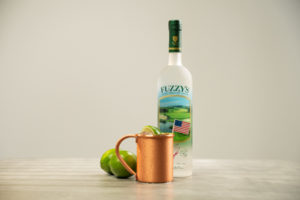
2 ounces Fuzzy’s Vodka
½ ounce fresh lime juice
Ginger beer
Directions:
Fill a copper mug with crushed ice and add the first two ingredients. Top with ginger beer.
Garnish with fresh mint and lime wedge.
Eastside Distilling
Eastside’s Portland Potato Vodka (PPV) announced that it will be donating 10% of profits from sales of PPV’s 1.75 liter bottles sold (from March 1 until June 30) to the International Rescue Committee as they support displaced families and people affected by the Ukraine crisis.


